| Listing 1 - 10 of 11 | << page >> |
Sort by
|
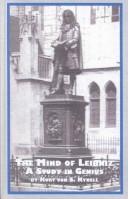
ISBN: 0773468935 Year: 2003 Publisher: Lewiston Mellen
Abstract | Keywords | Export | Availability | Bookmark
 Loading...
Loading...Choose an application
- Reference Manager
- EndNote
- RefWorks (Direct export to RefWorks)
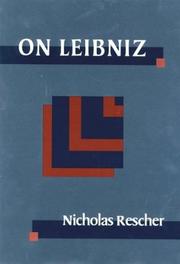
ISBN: 0822942089 9780822942085 Year: 2003 Publisher: Pittsburgh (Pa.): University of Pittsburgh Press,
Abstract | Keywords | Export | Availability | Bookmark
 Loading...
Loading...Choose an application
- Reference Manager
- EndNote
- RefWorks (Direct export to RefWorks)
Book
Abstract | Keywords | Export | Availability | Bookmark
 Loading...
Loading...Choose an application
- Reference Manager
- EndNote
- RefWorks (Direct export to RefWorks)
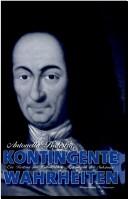
ISBN: 3826024915 Year: 2003 Volume: 345 Publisher: Würzburg Königshausen & Neumann
Abstract | Keywords | Export | Availability | Bookmark
 Loading...
Loading...Choose an application
- Reference Manager
- EndNote
- RefWorks (Direct export to RefWorks)
Metaphysics --- Substance (Philosophy) --- Matter --- Ontology --- Reality --- God --- Philosophy --- Philosophy of mind --- Leibniz, Gottfried Wilhelm, --- Leibnitz, Gottfried Wilhelm --- Leibniz, Gottfried Wilhelm
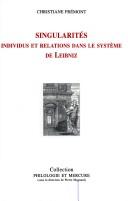
ISBN: 9782711615926 2711615928 Year: 2003 Publisher: Paris: Vrin,
Abstract | Keywords | Export | Availability | Bookmark
 Loading...
Loading...Choose an application
- Reference Manager
- EndNote
- RefWorks (Direct export to RefWorks)
Philosophy, Modern. --- Philosophie moderne --- Leibniz, Gottfried Wilhelm, --- Philosophy, Modern --- Modern philosophy --- Leibniz, Gottfried Wilhelm --- Leibnitz, Gottfried Wilhelm
Book
Year: 2003 Publisher: Göttingen: Vandenhoeck und Ruprecht,
Abstract | Keywords | Export | Availability | Bookmark
 Loading...
Loading...Choose an application
- Reference Manager
- EndNote
- RefWorks (Direct export to RefWorks)
Multi
ISSN: 15714764 ISBN: 1283640864 9400750315 9400750307 9400798881 Year: 2003 Volume: v. 14 Publisher: Dordrecht Springer
Abstract | Keywords | Export | Availability | Bookmark
 Loading...
Loading...Choose an application
- Reference Manager
- EndNote
- RefWorks (Direct export to RefWorks)
This book provides an analytical interpretation of Leibniz's 'Essais de Théodicée' with wide-ranging references to all his works. It shows and upholds many thesis: Leibniz's rational conception of faith, his rational notion of mystery, the reformation of classical ontology, and the importance of Leibniz's thought in the tradition of the critical idealism. In his endeavor to formulate a theodicy, Leibniz emerges as a classic exponent of a non-immanentist modern rationalism, capable of engaging in a close dialogue with religion and faith. This relation implies that God and reason are directly involved in posing the challenge and that the defence of one is the defence of the other. Theodicy and logodicy are two key aspects of a philosophy which is open to faith and of a faith which is able to intervene in culture and history.
Theodicy.
---
Leibniz, Gottfried Wilhelm,
---
Evil, Problem of (Theology)
---
God
---
Permissive will of God
---
Problem of evil (Theology)
---
Permissive will
---
Will, Permissive
---
Leibniz, Gottfried Wilhelm, Freiherr von, 1646-1716. Essais de théodicée.
---
Philosophy.
---
Ethics.
---
Metaphysics.
---
Modern philosophy.
---
Ontology.
---
Religion
---
History of Philosophy.
---
Modern Philosophy.
---
Philosophy of Religion.
---
Good and evil
---
Philosophy (General).
---
Philosophy, modern.
---
Deontology
---
Ethics, Primitive
---
Ethology
---
Moral philosophy
---
Morality
---
Morals
---
Philosophy, Moral
---
Science, Moral
---
Philosophy
---
Values
---
Modern philosophy
---
Ontology
---
Philosophy of mind
---
Mental philosophy
---
Humanities
---
Being
---
Metaphysics
---
Necessity (Philosophy)
---
Substance (Philosophy)
---
Religion—Philosophy.
---
Leibnizius, Godefridus G.
---
Leibnizius, Godofredus G.
---
Leibnizius, Godfridus Guilielmus
---
Leibnizius, Gottfredus G.
---
Leibniz, Godofredus G.
---
Leibniz, Goffredo Guglielmo
---
Leibniz, Goffredo G.
---
Leibniz, Gottfried W.
---
Leibniz, Gottfried G.
---
Leibniz, Guglielmo
---
Leibniz, G. Guglielmo
---
Leibnitii, ...
---
Leibniz, Georg W.
---
Leibnitius, Godefredus Guilielmus
---
Leibnitius, Guillielmus G.
---
Leibnitius, Godofredus G.
---
Leibnitius, Godofridus G.
---
Leibnitius, Godefridus G.
---
Leibnitius, Gottefridus
---
Leibnitius, Gulielmus
---
Leibnitius, God. Guil.
---
Leibnitzius, Gothofredus Guilielmus
---
Leibnitzius, Gotofredus Gulielmus
---
Leibnitzius, Godofredus G.
---
Leibnitz, Godofredus G. <
Book
Year: 2003 Publisher: Göttingen : Vandenhoeck & Ruprecht,
Abstract | Keywords | Export | Availability | Bookmark
 Loading...
Loading...Choose an application
- Reference Manager
- EndNote
- RefWorks (Direct export to RefWorks)
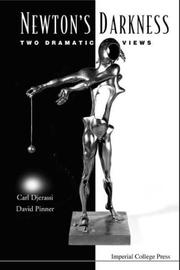
ISBN: 1281866377 9786611866372 1860944590 9781860944598 9781860943898 1860943896 9781860943904 186094390X 9781281866370 1860943896 186094390X 661186637X Year: 2003 Publisher: London : River edge, NJ : Imperial College Press ; distributed by World Scientific Publishing,
Abstract | Keywords | Export | Availability | Bookmark
 Loading...
Loading...Choose an application
- Reference Manager
- EndNote
- RefWorks (Direct export to RefWorks)
"What purpose is served by showing that England's greatest natural philosopher is flawed ... like other mortals?" asks one of the characters in Newton's Darkness. "We need unsullied heroes!" But what if the hero is sullied? At stake is an issue that is as germane today as it was 300 years ago: a scientist's ethics must not be divorced from scientific accomplishments. There is probably no other scientist of whom so many biographies and other historical analyses have been published than Isaac Newton - all of them in the standard format of documentary prose because of their didactic purpose to transmit historical information. Newton's Darkness, however, illuminates the darker aspects of Newton's persona through two historically grounded plays dealing with two of the bitterest struggles in the history of science. The name of Isaac Newton appears in virtually every survey of the public's choice for the most important persons of the second millennium. Yet the term "darkness" can be applied to much of Newton's personality. Adjectives that have been used to describe facets of his personality include "remote", "lonely", "secretive", "introverted", "melancholic", "humorless", "puritanical", "cruel", "vindictive" and, perhaps worst of all, "unforgiving". The trait most relevant to the present book is Newton's obsessively competitive nature, which was often out of proportion to the warranted facts, as demonstrated in three of Newton's best-known bitter conflicts: with the physicist Robert Hooke, the astronomer royal John Flamsteed, and a German contemporary of almost equal intellectual prowess, Gottfried Wilhelm Leibniz - the last fight eventually turning into an England vs Continental Europe competition. It is two of these three relentless drawn-out battles that are illuminated in Newton's Darkness in the form of historically grounded drama. After a summary of the historical evidence, the book starts with the Newton-Hooke struggle (Chapter 2), which was conducted mano a mano, and is then followed by little-known aspects of the Newton-Leibniz confrontation (Chapter 3), which was fought largely through surrogates - notably the infamous, anonymous committee of 11 Fellows of the Royal Society.
Science --- Scientists --- Professional employees --- Natural science --- Natural sciences --- Science of science --- Sciences --- History --- Newton, Isaac, --- Leibniz, Gottfried Wilhelm, --- Hooke, Robert, --- Newton, Izaak, --- Niu-tun, --- Nʹi︠u︡ton, Isaak, --- Niutun, Yisake, --- Niyu̇ton, Isak, --- Nyuṭon, Ayzaḳ, --- Nyuṭon, Ayziḳ, --- ניוטאן, אייזאק, --- ניוטון, אייזק --- ניוטון, אייזיק --- 牛頓, --- 牛頓, 伊萨克, --- Leibnitz, Gottfried Wilhelm --- Leibniz, Gottfried Wilhelm --- Guk, Robert, --- Hooke, Robert
Book
ISBN: 363151672X Year: 2003 Volume: 2 Publisher: Frankfurt am Main ; Bruxelles ; New York Peter Lang
Abstract | Keywords | Export | Availability | Bookmark
 Loading...
Loading...Choose an application
- Reference Manager
- EndNote
- RefWorks (Direct export to RefWorks)
God--Permissive will --- God--Will Permissive --- Permissive will of God --- Theodicee --- Theodicy --- Théodicée --- Monadology --- Evil, Problem of (Theology) --- God --- Problem of evil (Theology) --- Good and evil --- Monads (Philosophy) --- Cosmology --- Philosophy --- Pluralism --- Permissive will --- Will, Permissive --- Kant, Immanuel, --- Leibniz, Gottfried Wilhelm, --- Kant, Emmanuel --- Kant, Emanuel --- Kant, Emanuele --- Kant, Immanuel --- Leibniz, Gottfried Wilhelm --- Kant, I. --- Kānt, ʻAmmānūʼīl, --- Kant, Immanouel, --- Kant, Immanuil, --- Kʻantʻŭ, --- Kant, --- Kant, Emmanuel, --- Ḳanṭ, ʻImanuʼel, --- Kant, E., --- Kant, Emanuel, --- Cantơ, I., --- Kant, Emanuele, --- Kant, Im. --- קאנט --- קאנט, א. --- קאנט, עמנואל --- קאנט, עמנואל, --- קאנט, ע. --- קנט --- קנט, עמנואל --- קנט, עמנואל, --- كانت ، ايمانوئل --- كنت، إمانويل، --- カントイマニユエル, --- Kangde, --- 康德, --- Kanṭ, Īmānwīl, --- كانط، إيمانويل --- Kant, Manuel,
| Listing 1 - 10 of 11 | << page >> |
Sort by
|

 Search
Search Feedback
Feedback About UniCat
About UniCat  Help
Help News
News